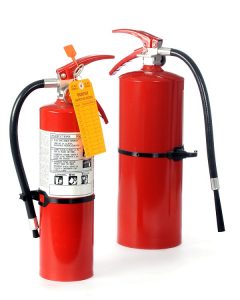
Eventually, your fire extinguishers will need to be recharged. At the same time, they will also lose pressure.
Eventually, your fire extinguishers will need to be recharged. At the same time, they will also lose pressure. It might not seem like a problem, but fire extinguishers need that pressure to be able to dispense their fire suppressing agents where you need it and when you need it. Let’s find out why this depressurization happens.
Why Does This Happen?
Different fire extinguishers have different contents. Some contain water, but water isn’t always the most effective countermeasure for a fire. That’s why others contain a chemical foam agent. The contents are then pressurized with a gas that helps dispense what is called the extinguishing agent. Look closely at the valves on your fire extinguishers. Are they damaged at all?
Physical damage could contribute to the fire extinguisher venting the gas prematurely, causing the fire extinguisher to malfunction, jam, or misfire when you need it most. Leaks in the O-ring seal or the valve stem can also make any existing problems worse. Then again, it’s just as likely that the cylinder of the extinguisher has been damaged somehow, too.
Why Is It Dangerous?
Leaks and loss of pressure are causes for concern, but they aren’t problems by themselves. Without enough pressure, the fire extinguisher won’t work as it should. This means a small fire can grow larger or get even more out of control. You also need to make sure you have the correct type of extinguishing agent for your purposes. Paper fires in an office can be put out with water, but a fire in the kitchen that could involve cooking oils or grease are much harder to suppress – which is why restaurants and hotels and other businesses featuring kitchens need to be even more vigilant when it comes to fire safety.
What Can I Do?
Take a close look at your fire extinguisher. The pressure sensor will read out “recharge” or “overpressurized,” but in both cases, this can be dangerous. What you must do next is consult your fire protection partner, such as Judd Fire Protection. Our technicians can make sure the fire extinguisher is still safe to use before recharging the extinguisher or releasing excess pressure. In some cases, your fire extinguishers might have outlived their usefulness. What this means is that you will have to get new extinguishers that you can depend on the next time a fire breaks out in your home or business.
Commercial and Residential Fire Prevention from Judd Fire Protection
If you want to ensure your home and business are safe throughout the year, trust Judd Fire Protection, LLC. We have over two decades of experience in designing, installing, inspecting, and repairing residential and commercial fire protection systems. We serve clients throughout Maryland, Pennsylvania, Washington, D.C., Virginia, and West Virginia. If you are interested in finding out more about our services and protecting your home and business, give us a call at 410-871-3480 or contact us online. For more fire safety tips, follow us on Facebook, Twitter, and Pinterest.
